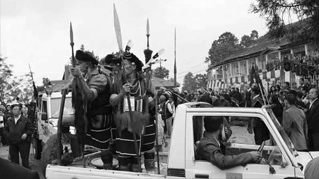The Highland Institute, on December 8th and 9th (2016), hosted the fourth annual Hutton Lecture and symposium on the theme ‘Indigenous Knowledge‘. The event was co-organised with Ambedkar University’s North East Forum (NEF), and Centre for Community Knowledge (CCK), in partnership with University of Tromsø – the Arctic University of Norway, and in particular members of the Indigenous Religion(s): Local Grounds, Global Networks (INREL) research group. All participating organisations provided invaluable programme support, and generous funding. Professor Siv Ellen Kraft, director of INREL opened the conference with the keynote address “Indigenous knowledge in the making: Pan-Indigenous religion at Standing Rock“.
Keynote Lecture
Focusing on Indigenous Knowledge, Prof. Ellen Kraft delineated the new and emerging forms of Indigenous knowledge in relation to pan indigenous religion with a special emphasis on the ongoing protests at Standing Rock, US against the Dakota Access pipelines. Proclaiming themselves as Protectors rather than protestors, the Standing Rock protest movements is considered a grassroots movement of the indigenous peoples in the US who also have received greater support from indigenous peoples across the world. One of the primary identities of Indigeneity being indigenous religion, the Standing Rock movement has also instilled the indigenous religion among the protestors. Prof. Kraft also stated that the case of Standing Rock is interesting because it is one of the largest gatherings of different indigenous peoples, where the various groups are working in collaboration and solidarity for a particular cause.
“Indigenous people are becoming more similar but they are also becoming more distinct due to the awareness of selfhood and identity,”
Prof. Ellen Kraft
The Standing Rock protest movement has also created a ritual liminality, a liminal space where people live outside their normal habitat where their lifestyles and social statuses are suspended. Another aspect is the ‘a mediascape of their own making’ as Prof. Kraft mentioned where the indigenous peoples in the protest has been able to develop their own news in their own perspectives with the help of social networking sites without relying on mainstream media. Envisioning ‘a diffusion of knowledge between international scholars and local writers, thinkers, scholars, and social leaders’, the symposium will focus on the “cross-fertilisation of indigenous knowledge and new forms of transmission, encouraging different perspectives on ways of knowing and of disseminating knowledge, including experiential knowledge.”
Symposium
The second day of the symposium comprised of workshops, panel discussions and interactions on the topics ‘Foods, orality, language, and practices’, ‘Orality, knowledge, and transmission’, and ‘Indigenous knowledge and contemporary times’. Presentations by international, national, regional, and local scholars discussed the fraught historical, ideological, and diffusing genealogies of ‘indigenous’ and its epistemological status in relation to western science, as well as important contemporary uses of the term (particularly by activists) in political debates, and in relation to developmental aid, and environmental conservation.
Presentations, papers, and exhibitions will be edited and published in The South Asianist Journal at Edinburgh University, and appear in book form in 2017


